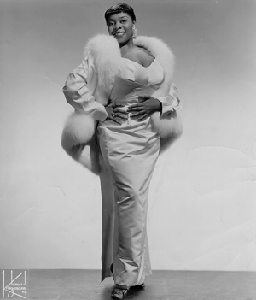ダイナ・ワシントン Dinah Washington
"ブルースの女王"として有名だが、ダイナ・ワシントンが吹き込んだ膨大な数のレコードは、米国大衆音楽の全ジャンルに及ぶといっても過言ではない。ライ
オネル・ハンプトン楽団の専属歌手にはじまり、40年代後半にはR&Bシンガー、そして50年代にはストレート・アヘッドなジャズ・シンガーとし
て活躍。その後はポップスをも股にかけ全国区で人気を獲得した。しかし、そういった幅広いフィールドで活動を可能にしたのは、一声発しただけで劇場をシー
ンと静まり返らせるという歌唱力に他ならない。ビリー・ホリディに憧れて歌い始めたというが、彼女ほど悲壮感がなく、かわいげがあるというか、ひじょうに
大衆受けする要素を秘めていたのだ。後の女性シンガーに与えた影響も大きく、エスター・フィリップスやルース・ブラウンも彼女に夢中だったという。そう
いった意味でも、20世紀を代表するシンガーとして記憶されるべき存在だ。
goo音楽より

Dinah Washington
From Wikipedia, the
free encyclopedia
Dinah Washington (August 29, 1924 – December 14, 1963) was a blues,
R&B and jazz singer. Because of her strong voice and emotional
singing, she is known as the "Queen of the Blues". Despite dying of a
drug overdose in 1963, Dinah Washington became one of the most
influential vocalists of the twentieth century.
Early Life
Washington was born Ruth Lee Jones in Tuscaloosa, Alabama; her family
moved to Chicago while she was still a child. As she was growing up in
Chicago, she played piano and directed her church choir. Later, she
studied in Walter Dyett's renowned music program at DuSable High
School. For a while, she split her time between performing in clubs as
Dinah Washington while singing and playing piano in Salle Martin's
gospel choir as Ruth Jones.
Her penetrating voice, excellent timing, and crystal-clear enunciation
added her own distinctive style to every piece she undertook. While
making extraordinary recordings in jazz, blues, R&B and light pop
contexts, Washington refused to record gospel music despite her obvious
talent in singing it. She believed it wrong to mix the secular and
spiritual, and once she had entered the non-religious music world
professionally, she refused to include gospel in her repertoire.
Washington began performing in 1942 and soon joined Lionel Hampton's
band. There is some dispute about the origin of her name. Some sources
say the manager of the Garrick Stage Bar gave her the name Dinah
Washington; others say it was Hampton who selected it.
Rise to Fame
In 1943, she began recording for Keynote Records and released "Evil Gal
Blues", her first hit. By 1955, she had released numerous hit songs on
the R&B charts, including "Baby, Get Lost", "Trouble in Mind", "You
Don't Know What Love Is" (arranged by Quincy Jones), and a cover of
"Cold, Cold Heart" by Hank Williams. In March of 1957, she married the
tenor saxophonist, Eddie Chamblee, formerly on tour with Lionel
Hampton, who lead the band behind her. In 1958 she made a well-received
appearance at the Newport Jazz Festival.
With "What a Diff'rence a Day Makes" 1959, Washington won a Grammy
Award for Best Rhythm and Blues Performance; the song was her biggest
hit, reaching #8 on the Billboard Hot 100. The commercially driven
album of the same name, with its heavily reliance on strings and
wordless choruses, was slammed by jazz and blues critics as being far
too commercial, not keeping with her blues roots. Despite this, the
album was a huge success and Washington continued to favor more
commercial, pop-oriented songs rather than traditional blues and jazz
songs. Along with a string of other hits, she followed this with
"September In The Rain", which reached number 35 in the UK in November
1961 and #23 in the US. In 1960, she also had two top 10 hit duets with
Brook Benton: "Baby (You've Got What It Takes)" and "A Rockin' Good Way
(To Mess Around and Fall In Love)". She also dealt in torch songs; her
rendition of The Platters' "Smoke Gets In Your Eyes" was well-regarded.
Queen of the Blues
What set Dinah Washington apart from her contemporaries was her
extraordinary diction and phrasing. To this day, there hasn't been an
equal, although many have tried to recreate the Dinah Washington
experience. Her voice can still invoke a chill in many a modern
listener.
She was married seven times, and divorced six times while having
several lovers, including Quincy Jones, her young arranger. She was
known to be imperious and demanding in real life, but audiences loved
her. In London she once declared, "...there is only one heaven, one
earth and one queen...Queen Elizabeth is an impostor", but the crowd
loved it.
During her marriage to football player Dick "Night Train" Lane, she
died from an accidental overdose of diet pills and alcohol at the age
of 39 in 1963. She is interred in the Burr Oak Cemetery, Alsip,
Illinois.
Discography
What a Diff'rence a Day Makes (1959)
Virtually all of her recordings are currently in print on CDs including
a massive reissue series of her Mercury and EmArcy sessions.
External links
Dinah
Washington profile (Verve Records website)
